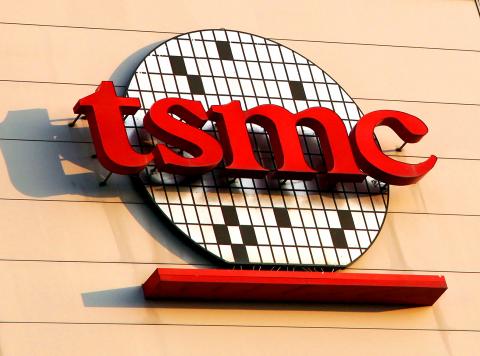Taiwan Semiconductor Manufacturing Co (TSMC, 台積電) and US rival GlobalFoundries Inc (GF) have ended their patent infringement dispute with a mutual licensing agreement that is to cover the next decade.
They “are dismissing all litigation between them as well as those that involve any of their customers,” the two companies said yesterday in a joint statement.
“The companies have agreed to a broad life-of-patents cross-license to each other’s worldwide existing semiconductor patents as well as those patents that will be filed during the next 10 years as both companies continue to invest significantly in semiconductor research and development,” the statement said.

Photo: David Chang, EPA-EFE
“This resolution guarantees TSMC and GF freedom to operate and ensures that their respective customers will continue to have access to each foundry’s complete array of technologies and services,” it added.
Santa Clara, California-based GlobalFoundries on Aug. 26 sued Hsinchu-based TSMC in the US and Germany, accusing it of infringing 13 of its patents held in the US and three in Germany, and seeking to stop imports into those two nations of products made with technologies using those patents, which include a huge number of products, such Apple Inc’s iPhones and iPads, Google Pixel smartphones and Nvidia graphics processing units.
GlobalFoundries filed two suits with the US International Trade Commission and corresponding civil suits in Delaware and Texas in the US, and Germany’s Dusseldorf and Mannheim.
It said that TSMC has been infringing on its semiconductor process technology patents for years without trying to arrange any form of partnership, licensing or cross-licensing agreement.
The Taiwanese firm on Sept. 30 filed lawsuits in the US, Germany and Singapore, accusing its smaller rival of infringing on 25 patents and stealing technologies involving 40, 28, 22, 14 and 12-nanometer processes.
GlobalFoundries chief executive Thomas Caulfield said the two sides were pleased by the settlement, which he described as recognition of “the strength of our respective intellectual property.”
“Today’s announcement enables both of our companies to focus on innovation and to better serve our clients around the world,” Caulfield said.
“This agreement between GF and TSMC secures GF’s ability to grow and is a win for the entire semiconductor industry, which is at the core of today’s global economy,” he added.
In the statement, TSMC general counsel Sylvia Fang (方淑華) said the semiconductor industry has been highly competitive, driving players to pursue innovation, and TSMC has invested tens of billions of dollars in innovation to reach its leading position.
“The resolution is a positive development that keeps our focus on advancing the needs of our customers for technologies that will continue to bring innovation to life, enabling the entire semiconductor industry to thrive and prosper,” she said.
TSMC shares yesterday climbed 1.36 percent to close at the day’s high of NT$298.50, with 36.62 million shares changing hands on the Taiwan Stock Exchange, outpacing the benchmark TAIEX, which closed up 0.17 percent at 11,333.87.
TSMC’s market capitalization rose to a new high of NT$7.74 trillion (US$253.6 billion) at the close, up from NT$7.64 trillion on Monday.

AIR SUPPORT: The Ministry of National Defense thanked the US for the delivery, adding that it was an indicator of the White House’s commitment to the Taiwan Relations Act Deputy Minister of National Defense Po Horng-huei (柏鴻輝) and Representative to the US Alexander Yui on Friday attended a delivery ceremony for the first of Taiwan’s long-awaited 66 F-16C/D Block 70 jets at a Lockheed Martin Corp factory in Greenville, South Carolina. “We are so proud to be the global home of the F-16 and to support Taiwan’s air defense capabilities,” US Representative William Timmons wrote on X, alongside a photograph of Taiwanese and US officials at the event. The F-16C/D Block 70 jets Taiwan ordered have the same capabilities as aircraft that had been upgraded to F-16Vs. The batch of Lockheed Martin

US President Donald Trump yesterday announced sweeping "reciprocal tariffs" on US trading partners, including a 32 percent tax on goods from Taiwan that is set to take effect on Wednesday. At a Rose Garden event, Trump declared a 10 percent baseline tax on imports from all countries, with the White House saying it would take effect on Saturday. Countries with larger trade surpluses with the US would face higher duties beginning on Wednesday, including Taiwan (32 percent), China (34 percent), Japan (24 percent), South Korea (25 percent), Vietnam (46 percent) and Thailand (36 percent). Canada and Mexico, the two largest US trading

GRIDLOCK: The National Fire Agency’s Special Search and Rescue team is on standby to travel to the countries to help out with the rescue effort A powerful earthquake rocked Myanmar and neighboring Thailand yesterday, killing at least three people in Bangkok and burying dozens when a high-rise building under construction collapsed. Footage shared on social media from Myanmar’s second-largest city showed widespread destruction, raising fears that many were trapped under the rubble or killed. The magnitude 7.7 earthquake, with an epicenter near Mandalay in Myanmar, struck at midday and was followed by a strong magnitude 6.4 aftershock. The extent of death, injury and destruction — especially in Myanmar, which is embroiled in a civil war and where information is tightly controlled at the best of times —

China's military today said it began joint army, navy and rocket force exercises around Taiwan to "serve as a stern warning and powerful deterrent against Taiwanese independence," calling President William Lai (賴清德) a "parasite." The exercises come after Lai called Beijing a "foreign hostile force" last month. More than 10 Chinese military ships approached close to Taiwan's 24 nautical mile (44.4km) contiguous zone this morning and Taiwan sent its own warships to respond, two senior Taiwanese officials said. Taiwan has not yet detected any live fire by the Chinese military so far, one of the officials said. The drills took place after US Secretary